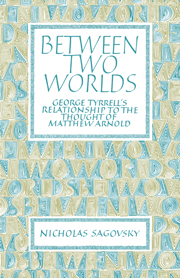Book contents
- Frontmatter
- Contents
- Acknowledgments
- Abbreviations and note on references
- 1 Tyrrell and Arnold ‘between two worlds’
- 2 The history of an opinion
- 3 ‘Definite evidence’
- 4 Fundamental convergence: epistemology and metaphysics
- 5 The life of the spirit: ecclesiology and culture
- 6 Christology: the parting of the ways
- 7 God, and ‘the Power that makes for Righteousness’
- 8 Conclusions
- Appendix Two letters to the Abbé Venard
- Notes
- Select bibliography
- Index
5 - The life of the spirit: ecclesiology and culture
Published online by Cambridge University Press: 23 October 2009
- Frontmatter
- Contents
- Acknowledgments
- Abbreviations and note on references
- 1 Tyrrell and Arnold ‘between two worlds’
- 2 The history of an opinion
- 3 ‘Definite evidence’
- 4 Fundamental convergence: epistemology and metaphysics
- 5 The life of the spirit: ecclesiology and culture
- 6 Christology: the parting of the ways
- 7 God, and ‘the Power that makes for Righteousness’
- 8 Conclusions
- Appendix Two letters to the Abbé Venard
- Notes
- Select bibliography
- Index
Summary
In his Autobiography, Tyrrell, always attributing to himself the most paradoxical motives, describes how he was drawn by the externals of Catholicism, ‘the very fringe and extreme outskirts of Christianity’ (p. 102). He presents this as a boyish attraction to ritual and mystery which only developed into a serious quest for God, when he recognised his need ‘to find a basis for a system that hung mid-air save for the scaffolding of mixed motives which made me cling to it blindly, in spite of a deep-down sense of instability’ (p. 112). If he was to be a Catholic, he had to believe sincerely in God. Such conviction was hard-won, but in time it became the lynch-pin of his faith. As a mature man he listed his deepest convictions in precisely the reverse order from that in which he had come to them: ‘my dominant interest and strongest conviction is Theism; and dependently on this Christianity; and thirdly Catholicism’ (p. 112). This is also how he explained the order of his beliefs to Bremond: God, Christ, Catholicism. However, in the next three chapters we shall take these topics in the opposite order, the order in which Tyrrell came to accept them.
The fundamental reason for this mode of proceeding is precisely that implied in his choice of autobiography to make what amounted to a theological statement: Christian believing is more than the intellectual acceptance of a systematic theology, a point Tyrrell repeatedly emphasised.
- Type
- Chapter
- Information
- Between Two WorldsGeorge Tyrrell's Relationship to the Thought of Matthew Arnold, pp. 61 - 88Publisher: Cambridge University PressPrint publication year: 1983

